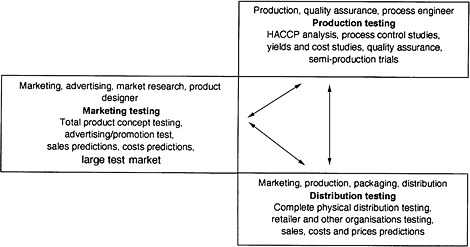FOOD
PRODUCT DEVELOPMENT
Mary Earle, Richard Earle and Allan Anderson |
| Loading
|
|
||||
|
|
Part
2, Chapter 3
The product development process 3.3.3 Testing The final product testing includes many aspects of the product:
 technical product qualities - core product qualities, packaged product technical product qualities - core product qualities, packaged product qualities, agreement with regulations, services with the product;  consumers' product concept - acceptance, competitive difference, consumers' product concept - acceptance, competitive difference, unique- ness, aesthetic worth, brand attitude, product worth;  marketing's product - product image, product position, promoted marketing's product - product image, product position, promoted product, product price, retailers' product image;  company's product - market share, sales revenue/profits, product company's product - market share, sales revenue/profits, product effectiveness in business strategy, product problems, company fit;  society's product - reliability, truthfulness of claims, protection from society's product - reliability, truthfulness of claims, protection from defects, value for money, social responsibility, environmental responsibility. Combined with the testing of the product, there is production, distribution and marketing testing as shown in Fig. 3.12.  Fig. 3.12 Testing in product commercialisation. Consumers test at least the total company product, with the packaging, advertising and public relations material; if time and cost allows the total product and the total marketing is studied in a test market. This can be an individual market or it can be the first phase in a roll-on marketing programme. Other important testing in the food industry is distribution testing which tests both the changes in product during transport and storage, and also the reactions of the retailers to the product. All food deteriorates with time - some in a few days, some in a year, and the effects of the temperatures, humidity, atmospheres and time during the transport and storage before sale has to be predicted. This is related to the label of the food with 'best by' dates. An important aspect of testing today, which will increase with the trends into nutriceuticals, is ethical product testing. Ethical testing is related to a particular society; and the type and degree of testing depends on the ethics of the society. Basically people want to trust the food industry: firstly not to harm them and in fact to improve their health, and secondly not to use fraud and deceit when providing them with food. It is not ethical for the food industry to claim a lack of knowledge when being criticised by the society for unethical behaviour. When launching a new food product onto the market, the company must have extensive and detailed knowledge of the product's benefits and defects, of the raw materials and ingredients, and of the truth of the advertising claims. Always, the company knowledge must be more than the general knowledge in the society and in particular the consumers' knowledge, and the company must be willing to provide their knowledge. The company must not deceive any one about either the benefits or the defects or the problems associated with the product (Legge, 1999). |
|
 |